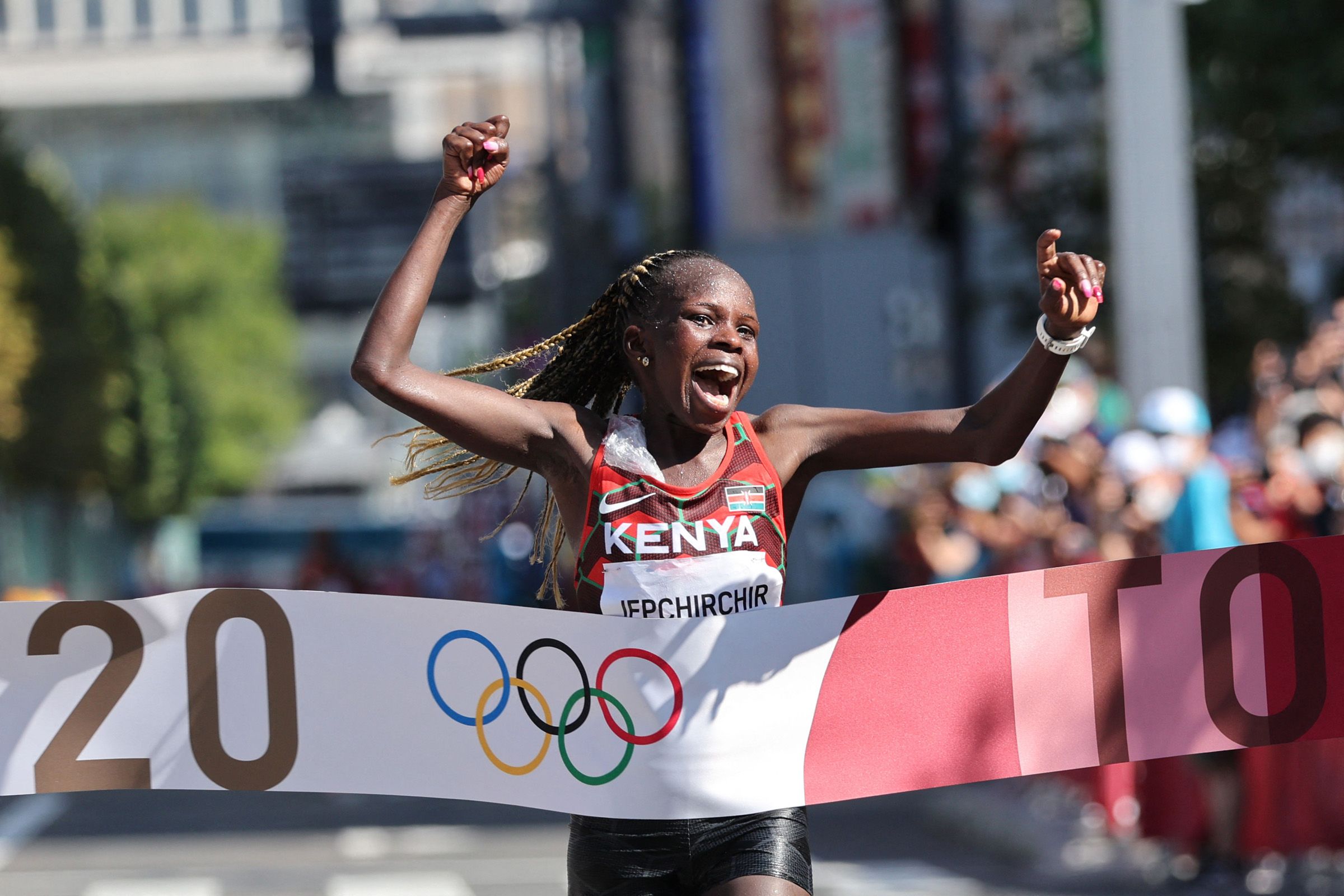Peres Jepchirchir, the former Olympic marathon champion and a celebrated figure in long-distance running, recently reflected on her challenging experience at the Paris 2024 Olympics. Jepchirchir, who entered the race with high hopes of defending her Olympic title, faced a disappointing finish, crossing the line in 15th place. This result was far from what she or her supporters had anticipated, especially given her status as one of the top contenders in the field.
A Tough Race in Tough Conditions
The marathon in Paris was expected to be a grueling contest, but even seasoned athletes like Jepchirchir found the conditions more challenging than anticipated. She attributed her struggles during the race to two primary factors: the oppressive heat and the hilly course. “The marathon was not easy because of the weather and hills. I am sad that I came home empty-handed, but I picked vital lessons. It is now time to work on my weak areas before the next assignment,” Jepchirchir shared in an interview with Nation.
The race, which took place on a sweltering day in the French capital, was made even more difficult by the hilly terrain that tested the endurance and mental toughness of all competitors. Jepchirchir, who has conquered many of the world’s toughest marathons, found herself struggling to maintain her usual pace and rhythm under these conditions. Despite her best efforts, the combination of the challenging environment and the pressure of defending her title proved too much.
The Fierce Competition
Adding to the difficulty of the race was the caliber of the competition. The marathon field included some of the world’s best long-distance runners, making it one of the most competitive events at the Olympics. Dutchwoman Sifan Hassan, who had already competed in the 5,000m and 10,000m events, ultimately won the gold medal, showcasing her incredible versatility and stamina. Ethiopian Tigist Assefa claimed the silver, while Kenya’s own Hellen Obiri secured the bronze, adding to Kenya’s medal tally but leaving Jepchirchir without a podium finish.
The Kenyan team, which also included Sharon Lokedi, was seen as a formidable force going into the marathon. However, the race dynamics shifted dramatically as the competitors dealt with the tough conditions. Hassan’s experience in handling high-pressure situations across multiple events likely gave her an edge, while Assefa and Obiri capitalized on their strengths to secure their places on the podium.
Mental and Physical Challenges
In addition to the physical demands of the race, Jepchirchir also acknowledged the mental strain she experienced. She admitted to feeling significant tension and pressure before the marathon, emotions that may have affected her performance on race day. The weight of expectations, both self-imposed and from her country, was immense. As a defending Olympic champion and one of Kenya’s top athletes, Jepchirchir knew that many were looking to her for a repeat of her Tokyo 2020 success.
This pressure, combined with the difficult race conditions, created a perfect storm that led to her underwhelming finish. However, Jepchirchir is not one to dwell on setbacks. Instead, she views these challenges as opportunities to learn and grow, both as an athlete and as a competitor on the global stage.
Looking Ahead: Redemption on the Horizon
Despite the disappointment in Paris, Jepchirchir remains optimistic about her future in marathon running. She is already looking ahead to her next challenges, with the Chicago Marathon in October and the New York Marathon in November being potential targets for her comeback. These races are seen as opportunities for Jepchirchir to redeem herself and reaffirm her status as one of the world’s elite marathoners.
The Berlin Marathon, scheduled for next month, was also considered, but Jepchirchir hinted that it might come too soon after the Paris experience. She is focused on ensuring that she is fully prepared, both mentally and physically, before taking on another major race. This approach reflects her commitment to excellence and her understanding of what it takes to compete at the highest level.
As she prepares for these upcoming races, Jepchirchir is likely to make adjustments to her training regimen, focusing on the areas she identified as weaknesses during the Paris marathon. Whether it’s acclimating to different weather conditions, refining her race strategy for hilly courses, or working on her mental resilience, Jepchirchir is determined to bounce back stronger.
The Road to Recovery and Beyond
Jepchirchir’s journey is far from over. At 30 years old, she still has plenty of competitive years ahead of her. The lessons learned from Paris will undoubtedly shape her approach to future races, and her experience as a seasoned marathoner will continue to serve her well. Her ability to analyze and adapt, coupled with her natural talent, makes her a formidable competitor in any race she enters.
In the world of marathon running, setbacks are inevitable. However, it’s how athletes respond to these challenges that define their careers. For Jepchirchir, the Paris 2024 Olympics was a moment of reflection and recalibration. It was a race that tested her limits, but it also reinforced her determination to succeed.
As she regroups and refocuses, Jepchirchir’s goal is clear: to bounce back stronger and continue her journey as one of the leading figures in women’s marathon running. Her sights are set on the future, and with her resilience and commitment, there’s every reason to believe that Peres Jepchirchir will once again stand atop the marathon world. The road to redemption is never easy, but Jepchirchir is more than ready for the challenge.
ALSO READ:Wiseman Were Eyes Redemption at 2025 World Championships After Paris Olympics Setback


